Love Butterfinger?? Then this Butterfinger cake recipe is for you! It’s made with moist chocolate cake layers, a crunchy Butterfinger filling, and decadent milk chocolate buttercream.
It’s made with moist chocolate cake layers, filled with crunchy butterfinger frosting, and frosted with decadent milk chocolate buttercream. This cake the perfect balance of textures and flavors!
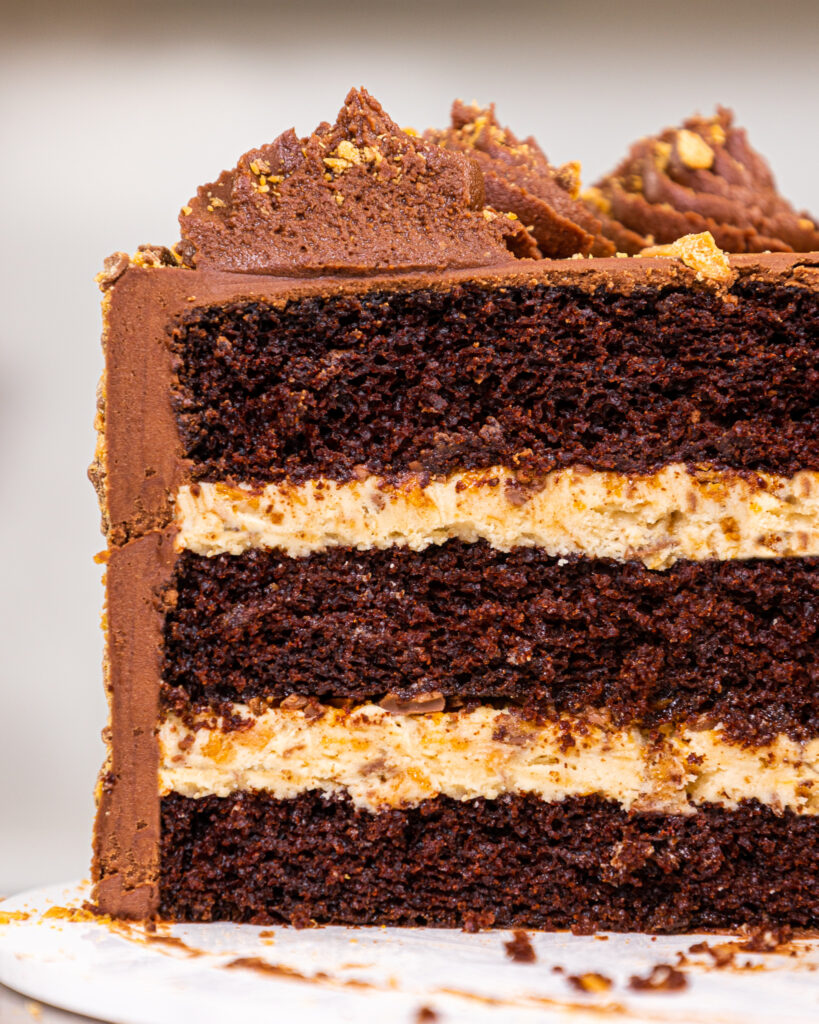
How to Make This Butterfinger Cake
To make sure your Butterfinger Cake turns out as amazing as possible, let’s walk through each step together! I’ve also included a video tutorial of the process below.
Step 1: Make the Chocolate Cake Layers
Start by combining all the dry ingredients together in a large bowl. Pour in the wet ingredients and then whisk to combine.
Divide the batter evenly between the four, seven-inch, or three eight-inch cake pans and bake.
Once the cake layers have baked and cooled, use a serrated knife to level the top of each cake layer.
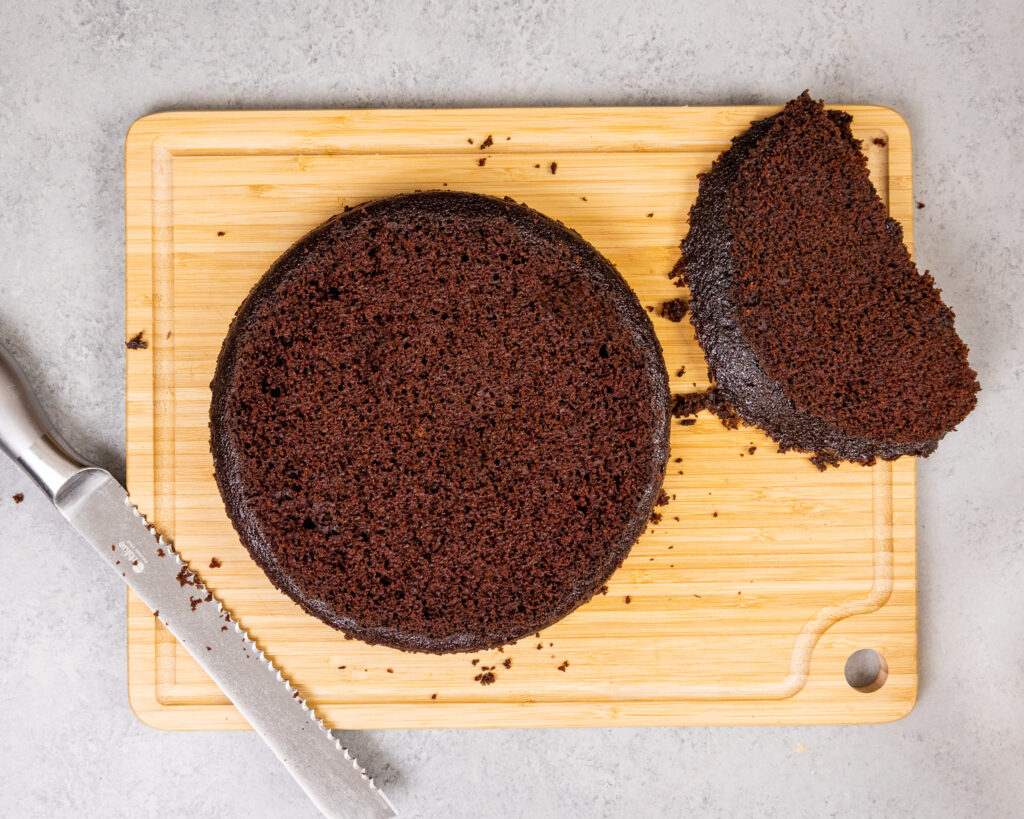
Step 2: Make the Buttercream and Butterfinger Filling
While the cake layers bake and cool, make the chocolate buttercream. This frosting can also be made in advance if needed and kept in the fridge for up to a month!
Cream the butter until smooth then mix in the peanut butter, vanilla, and salt. Slowly mix in the powdered sugar alternating with heavy cream until smooth.
Divide the frosting into two bowls and fold chopped Butterfingers into one of the bowls. Set aside.
Add the melted milk chocolate into the second bowl and mix until the ingredients are incorporated, then set aside.
Step 3: Assembling this Butterfinger Cake
Stack and frost cake layers on a greaseproof cake board. Use a dab of chocolate buttercream to help stick the first cake layer to the board.
Spread an even layer of peanut butter Butterfinger filling on top of each cake layer with a large offset spatula.
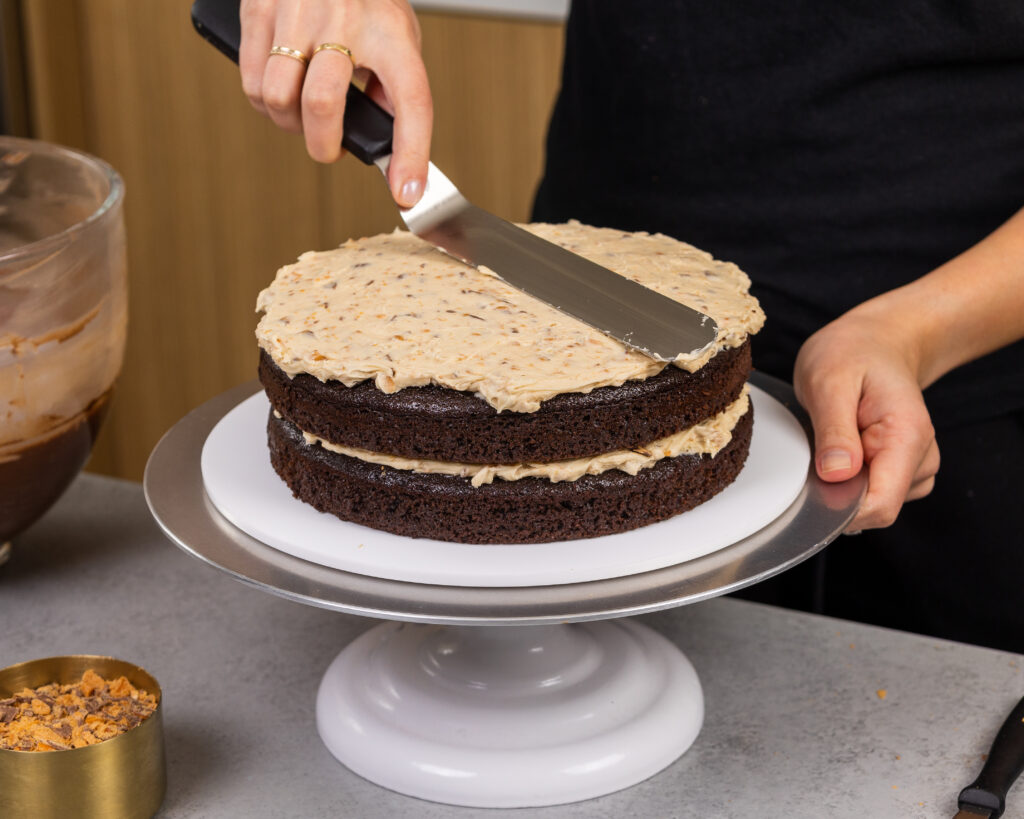
Repeat with the remaining cake layers, then cover the cake with a thin layer of chocolate peanut butter frosting. Smooth using a bench scraper, then chill the cake in the fridge or freezer.
Once the frosting is firm to the tough, add a thick layer of chocolate peanut butter buttercream around the cake and smooth.
Don’t worry if the frosting isn’t perfectly smooth, we’re going to be covering it up in the next step!
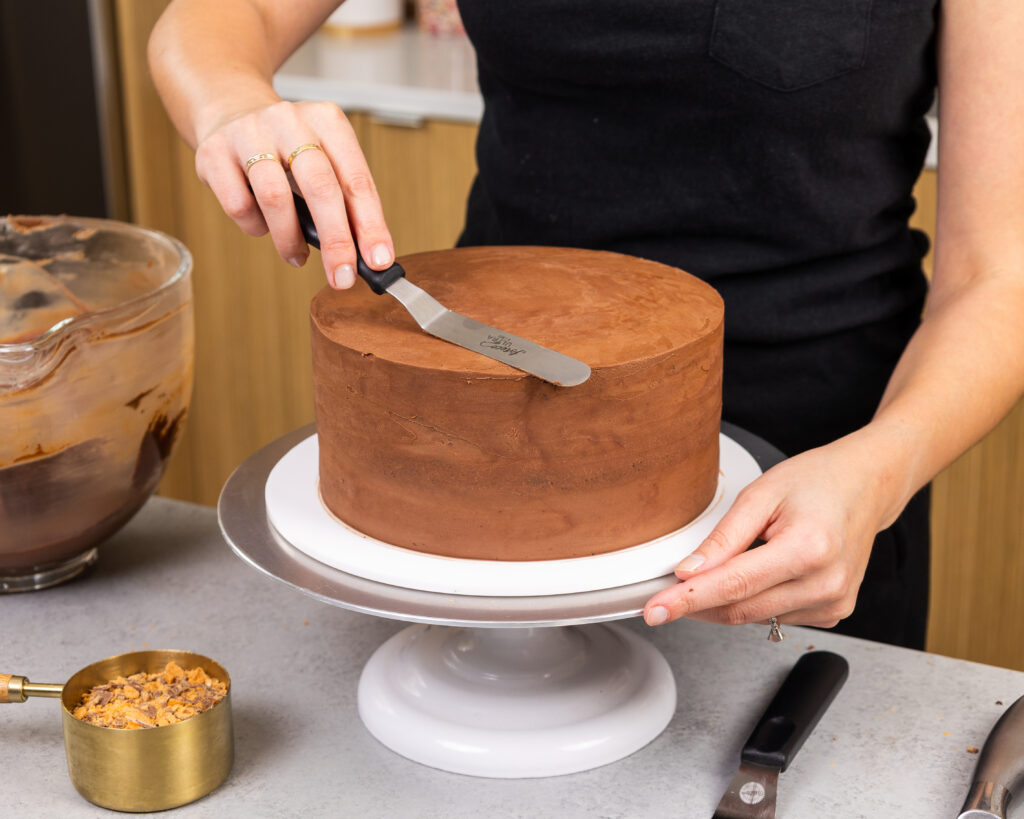
Carefully press bits of chopped Butterfinger into the frosting around the cake until the sides are completely covered.
Then decorate the top as desired! I like to place the leftover chocolate peanut butter frosting in a piping bag fit with an open star tip (I used an Ateco 829)and pipe swirls around the top of the cake.
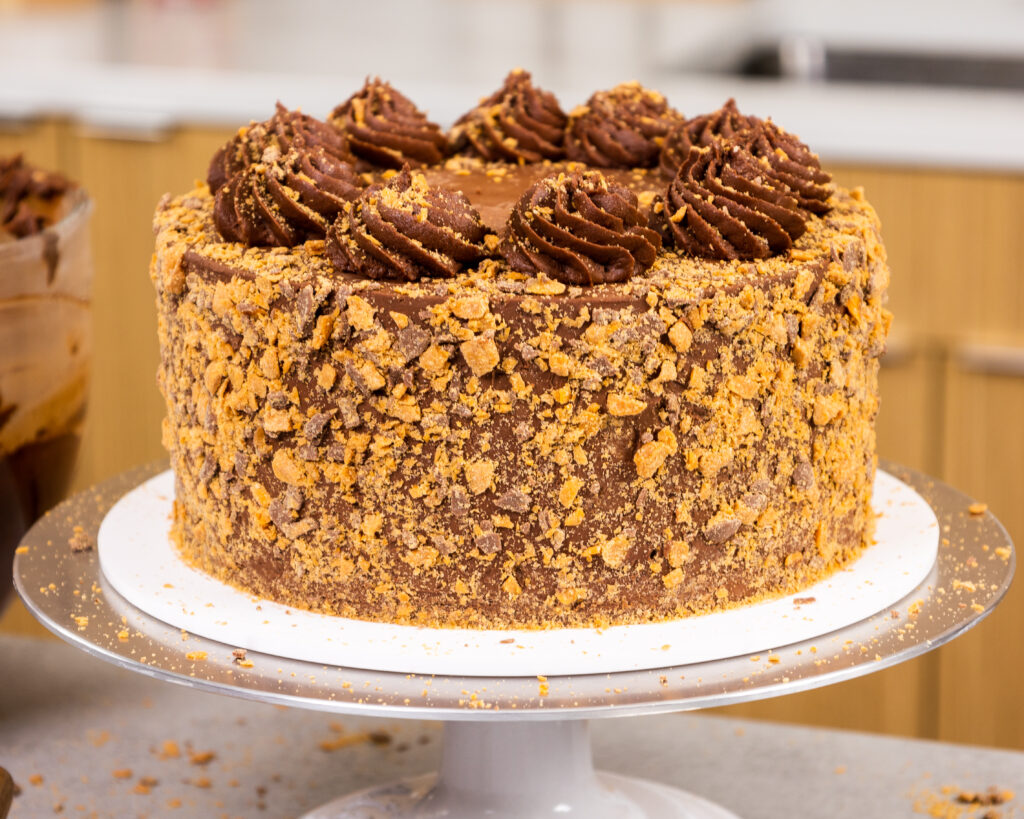
Swaps & Substitutions: Chocolate Cake
- All-Purpose Flour – This recipe turns out best with all-purpose flour. However, you can swap in a good gluten free flour blend (like this) if needed. Just be sure to stir the batter longer than normal to help give the cake proper structure, and let the batter sit for about 20 minutes before baking it if you opt to make a gluten free version.
- Unsweetened Cocoa Powder – I prefer using regular baking cocoa, but you can also use Dutch-processed or black cocoa powder.
- Granulated Sugar – I do not recommend reducing the amount of sugar or changing the type of sugar, as it will change the texture of the cake layers.
- Vegetable Oil – Any flavorless oil can be used in this recipe. Canola, vegetable, or even sunflower oil would all work great. I don’t recommend olive oil though, as it has a strong flavor and will change the taste of the cake.
- Unsalted Butter – If you only have salted butter on hand, you can use it in place of the unsalted butter. You can also use vegan butter in its place!
- Eggs – This recipe uses 2 large eggs. If you have an egg allergy you can try using a vegan egg replacer.
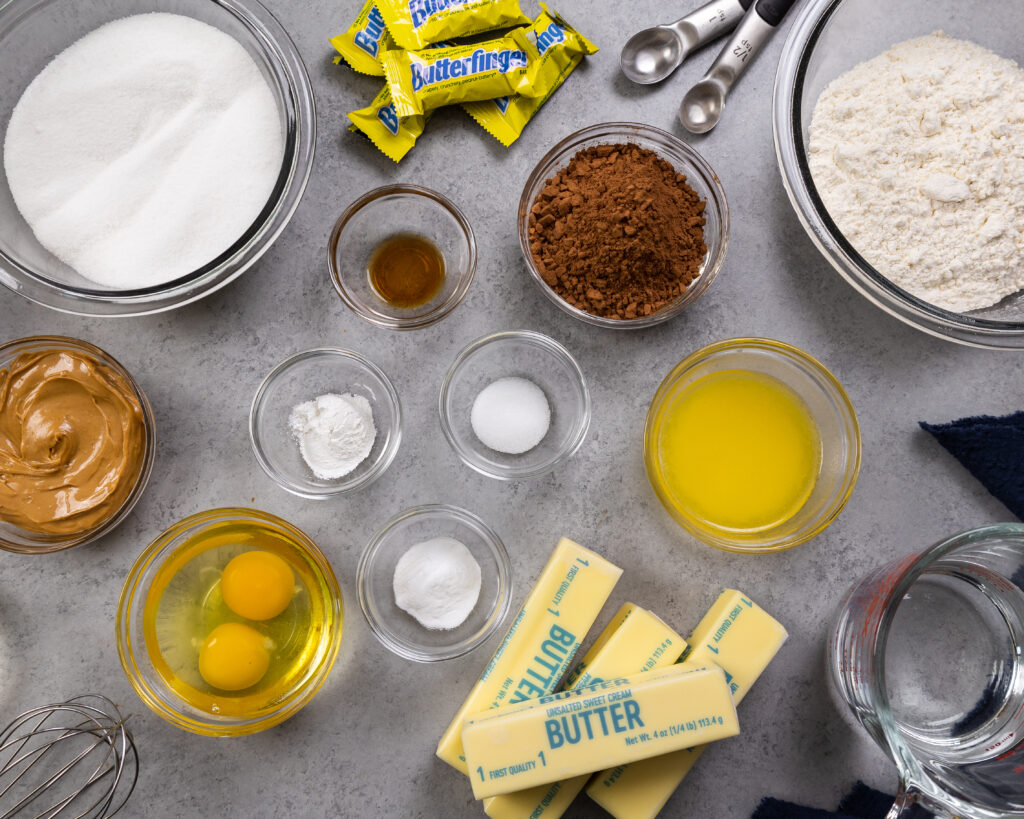
Substitutions & Swaps: Peanut Butter Buttercream
- Unsalted Butter – If you only have salted butter on hand, you can use it in place of the unsalted butter. Just be sure to omit the salt that this frosting recipe calls for. You can also use vegan butter in its place!
- Creamy Peanut Butter – I used creamy peanut butter because it mixes into the buttercream a lot easier and looks better too!
- Heavy Cream – Whole milk or alternative milk (soy, almond, oat) can also be used to make the frosting. However, I recommend using about half the amount the recipe calls for.
- Milk Chocolate Chips – I used milk chocolate chips but you can use baking chocolate, or good-quality chocolate bars to melt and add into the frosting. Alternatively, you can also use dark chocolate if you have a strong preference.
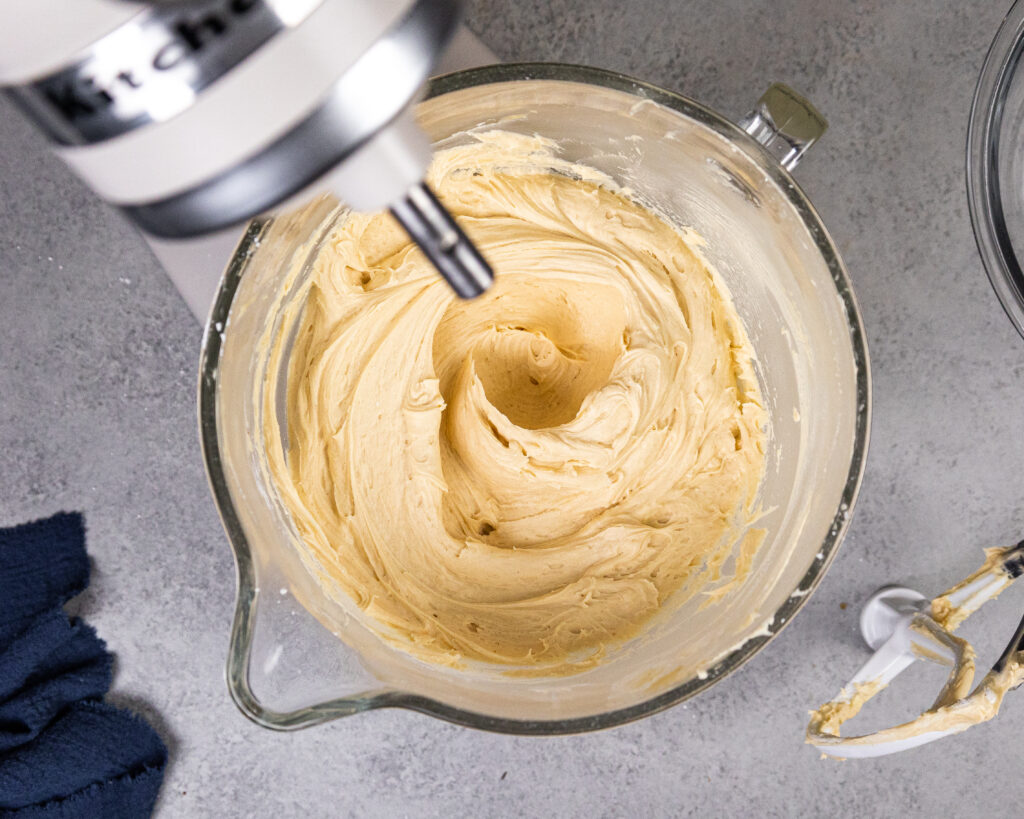
Tips for Making the Best Butterfinger Cake
- Ingredients at room temp mix together better! Be sure you set out any cold ingredients ahead of time.
- Properly measure your flour (spoon into the cup measure, then level). Or better yet, use a kitchen scale to measure your dry ingredients.
- Mix your cake batter just until the ingredients are incorporated. This will ensure your cake layers are tender and fluffy.
- Use a scale to weigh your cake pans as you fill them. Make sure each pan has the same amount of batter will make your cake layers bake to the same height and bake more evenly.
- Bang your cake pans on the counter before putting it in the oven. This brings any air bubbles that are trapped in the batter to the surface.
- Level your room temperature or thawed cake layers with a serrated knife to make them easier to stack.
- Let the melted chocolate sit at room temperature for about 10 minutes before adding it into the frosting. If you add it in straight out of the microwave, it can melt your frosting and make it too thin to work with.
- Chill your cake layers in the freezer for about 20 minutes before assembling the cake and before adding the simple syrup. It makes it so much easier to stack and frost them!
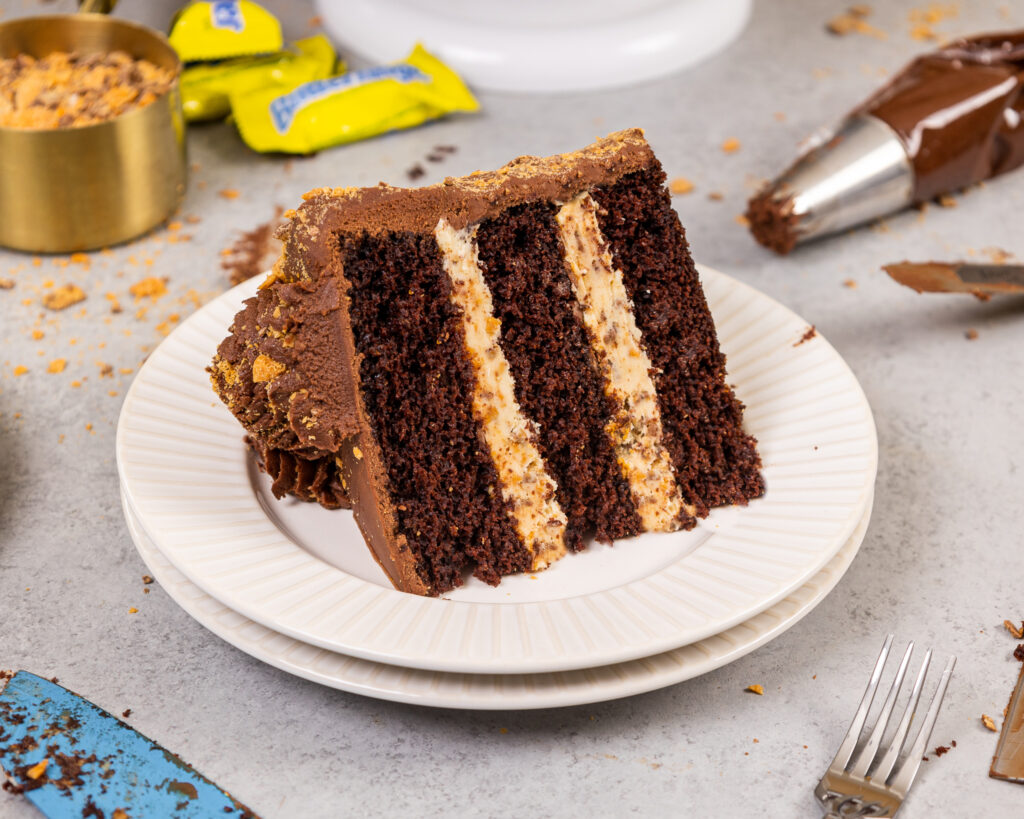
Making this Butterfinger Cake in Advance & Storage Tips
- Make your cake layers in advance and freeze them. It breaks the process up and makes it more approachable.
- Make your chocolate frosting ahead of time or save any leftover frosting! It can be stored in an airtight container in the fridge for up to a month.
- This frosting can also be stored in the freezer for up to 3 months! Just be sure to give it a good stir once it thaws to make it nice and smooth again.
- A frosted cake can last in the fridge for a week, or in the freezer for a month. The buttercream locks in the moisture and keeps the cake fresh and delicious!
Let Me Know What You Think
If you try this butterfinger cake recipe, I’d love to hear what you think! Please leave a rating below and a comment with your thoughts.
Other Recipes You Might Like:
Butterfinger Cake
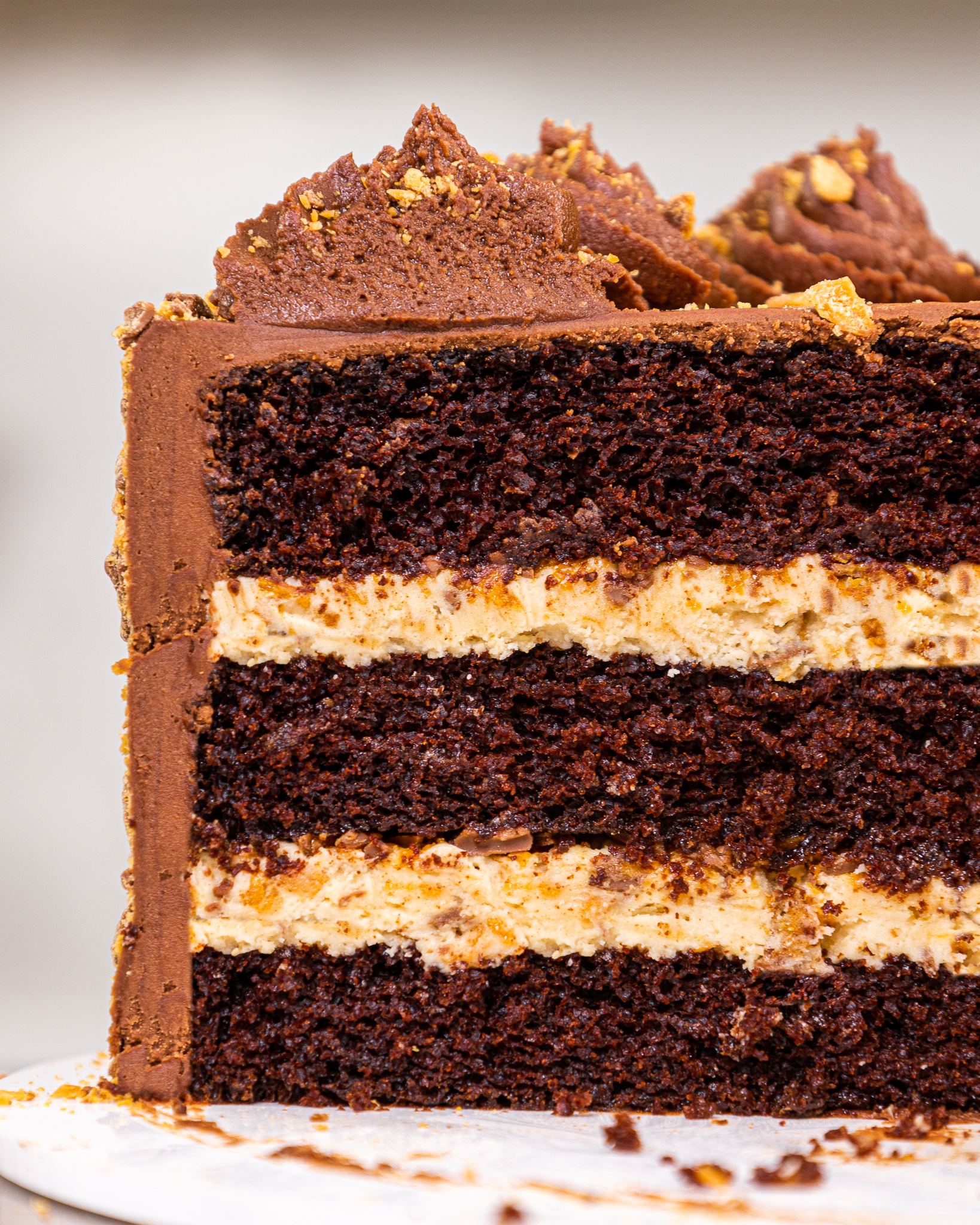
Love Butterfinger?? Then this butterfinger cake recipe is for you! It's made with moist chocolate cake layers, a crunchy butterfinger filling, and decadent milk chocolate buttercream.
Ingredients
Moist Chocolate Cake Recipe
- 2 cups all-purpose flour (250g)
- 2 cups granulated sugar (400g)
- 2 tsp baking powder (8g)
- 1 1/2 tsp baking soda (9g)
- 1 tsp salt (6g)
- 1 cup warm water (240ml)
- 1 cup buttermilk, room temperature (240ml)
- 3/4 cup unsweetened cocoa powder (60g)
- 2 large eggs, room temperature (112g)
- 1/3 cup vegetable oil (73ml)
- 1/4 cup melted butter (56g)
- 1 tsp vanilla extract (4ml)
Simple Syrup - Optional
- 1/2 cup granulated sugar (100g)
- 1/2 cup water (120ml)
Buttercream Filling and Frosting
- 2 cups (or 4 sticks) unsalted butter, room temperature (434g)
- 1/2 cup of creamy peanut butter (140g)
- 1 tsp vanilla extract (4ml)
- 1/2 tsp fine table salt (3g)
- 6 cups powdered sugar (750g)
- 1/2 cup heavy cream, room temperature (120ml)
- 1 cup chopped butterfinger pieces - about 10 fun-sized bars (200g)
- 1 1/3 cups milk chocolate chips, melted and cooled (230g)
Additional Cake Decoration
- 1 cup chopped butterfinger pieces - about 10 fun-sized bars (200g)
Recommended Tools
- 8-inch cake pans
- Spinning cake stand
- 10-inch greaseproof cake board
- Large offset spatula
- Bench Scraper
- Electric hand mixer or stand mixer
Instructions
Chocolate Cake Layers
- Preheat oven to 350 F / 175 C. Grease and line four, seven-inch or three eight-inch cake pans.
- Sift or whisk together the flour, sugar, baking powder, baking soda and salt into a large bowl.
- Pour in the warm water, buttermilk, and cocoa powder into a separate medium-sized bowl and whisk together until smooth. Add in the eggs, oil, melted butter and vanilla into a separate bowl and whisk together until combined.
- Mix the wet ingredients into the dry ingredients just until the ingredients are fully incorporated. The batter should look smooth and be somewhat thin.
- Divide the batter evenly between the prepared cake pans and bake for 22-25 minutes or until a toothpick comes out with a few moist crumbs.
- Remove the cake layers from the oven and let them cool in the pans for about 10 minutes. Gently run an offset spatula around the rim of the cake pans to loosen them, then flip them into wire racks to finish cooling.
- Once cooled, use a serrated knife to level the top of each cake layer. If you are making these in advance, wrap and freeze them at this point.
Simple Syrup
- Place the granulated sugar and water in a small sauce pan over medium heat, stirring occasionally.
- The sugar should be fully dissolved by the time the mixture begins to boil. Remove from heat and pour into a separate container to cool the mixture to room temperature. Set aside.
Buttercream Filling and Frosting
- Beat the butter on a medium speed for 30 seconds with a paddle attachment until smooth.
- Add in the creamy peanut butter, vanilla extract, and salt. Mix on low until the ingredients are incorporated.
- Slowly mix in the powdered sugar. Halfway through, add in the heavy cream to make the frosting easier to mix. Scrape the sides and bottom of the bowl as needed with a rubber spatula.
- Place 2 cups of the peanut butter frosting in a separate bowl. Fold in 1 cup of chopped up Butterfinger bits with a rubber spatula. Cover with plastic wrap and set aside.
- Once the milk chocolate is melted, let it sit at room temp for 10 minutes before mixing it into the remaining frosting on a low speed. It should still be fully liquid, but not as warm to the touch. This will prevent it from melting the butter in the frosting and throwing off the consistency of the frosting. Mix until the chocolate is fully incorporated and the desired consistency for the frosting is reached. Cover with plastic wrap to prevent crusting and set aside.
Assembling this Butterfinger Cake
- If you decide to add simple syrup, gently brush it on on top of each leveled cake layer with a silicone pastry brush. The top of each cake layer should look moist when you're done.
- Stack and frost cake layers on a greaseproof cake board using a dab of chocolate buttercream to help stick the first cake layer to the board.
- Spread an even layer of the peanut butter butterfinger filling on top of each cake layer as you stack them with a large offset spatula.
- Repeat with the remaining cake layers, then cover the cake with a thin layer of chocolate peanut butter frosting. Smooth using a bench scraper, then chill the cake in the fridge (20 minutes) or freezer (5 minutes) until the frosting is firm to the touch.
- Add a second, thicker layer of chocolate peanut butter frosting to the cake and smooth using a bench scraper. Don't worry if the frosting isn't perfectly smooth!
- Carefully press bits of chopped butterfinger into the frosting around the side of the cake until it's completely covered.
- Then decorate as desired! I like to place the leftover chocolate peanut butter frosting in a piping bag fit with an open star tip (I used an Ateco 829) and pipe swirls around the top of the cake. Then enjoy!
Notes
My Tips for Making the Best Butterfinger Cake
- Ingredients at room temp mix together better! Be sure you set out any cold ingredients ahead of time.
- Properly measure your flour (spoon into the cup measure, then level). Or better yet, use a kitchen scale to measure your dry ingredients.
- Mix your cake batter just until the ingredients are incorporated. This will ensure your cake layers are tender and fluffy.
- Use a scale to weigh your cake pans as you fill them. Make sure each pan has the same amount of batter will make your cake layers bake to the same heigh and bake more evenly.
- Bang your cake pans on the counter before putting it in the oven. This brings any air bubbles that are trapped in the batter to the surface.
- Level your room temperature or thawed cake layers with a serrated knife to make them easier to stack.
- Chill your cake layers in the freezer for about 20 minutes before assembling the cake and before adding the simple syrup. It makes it so much easier to stack and frost them!
Making this Butterfinger Cake in Advance & Storage Tips
- Make your cake layers in advance and freeze them. It breaks the process up and makes it more approachable.
- Make your chocolate frosting ahead of time or save any leftover frosting! It can be stored in an airtight container in the fridge for up to a month.
- This frosting can also be stored in the freezer for up to 3 months! Just be sure to give it a good stir once it thaws to make it nice and smooth again.
- A frosted cake can last in the fridge for a week, or in the freezer for a month. The buttercream locks in the moisture and keeps the cake fresh and delicious!
Nutrition Information
Yield
24Serving Size
1Amount Per Serving Calories 497Total Fat 18gSaturated Fat 7gTrans Fat 0gUnsaturated Fat 9gCholesterol 38mgSodium 405mgCarbohydrates 81gFiber 2gSugar 64gProtein 6g

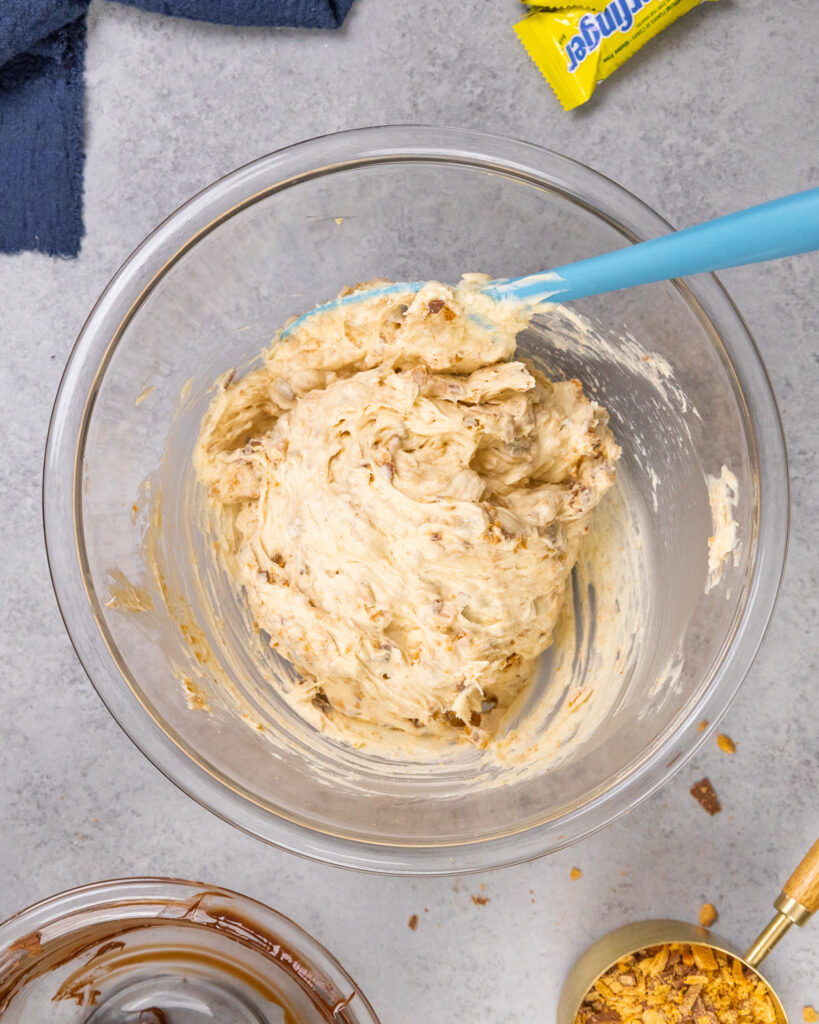

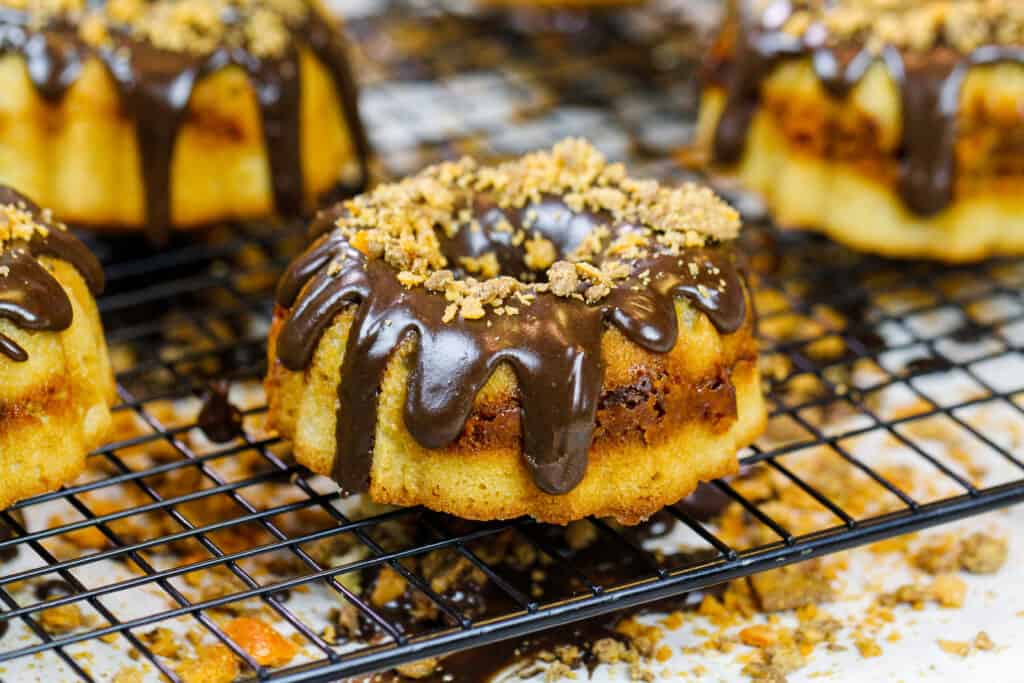
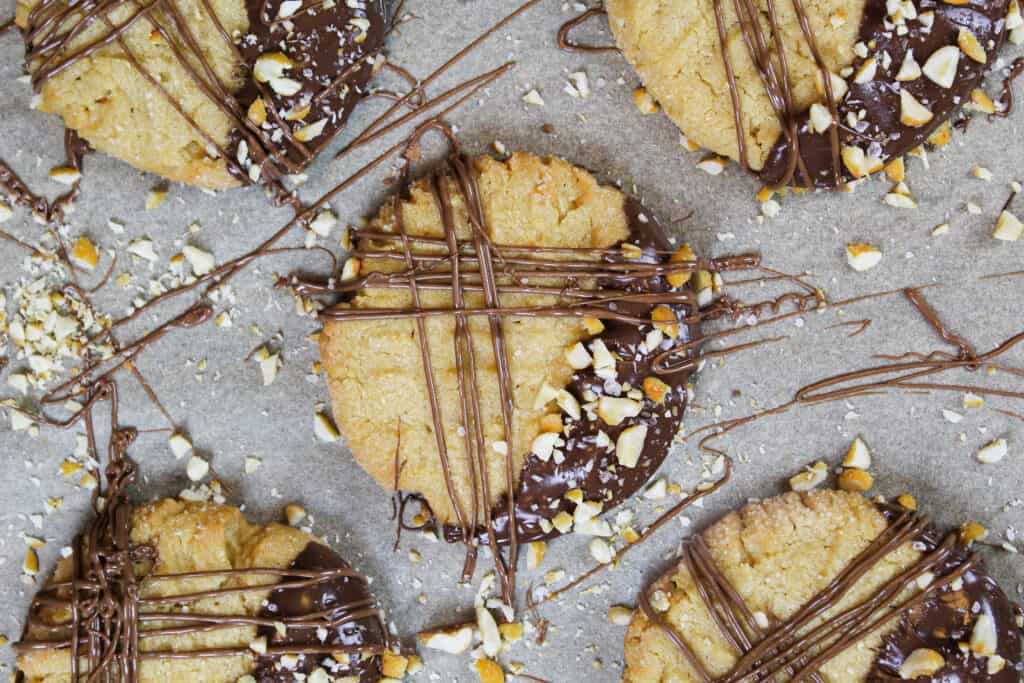
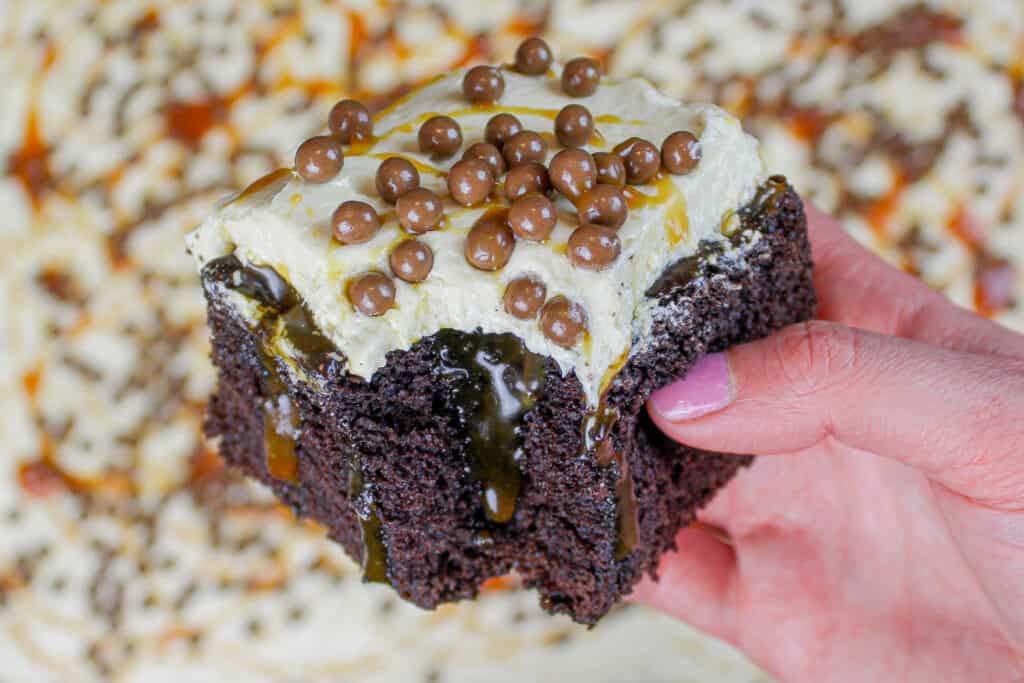
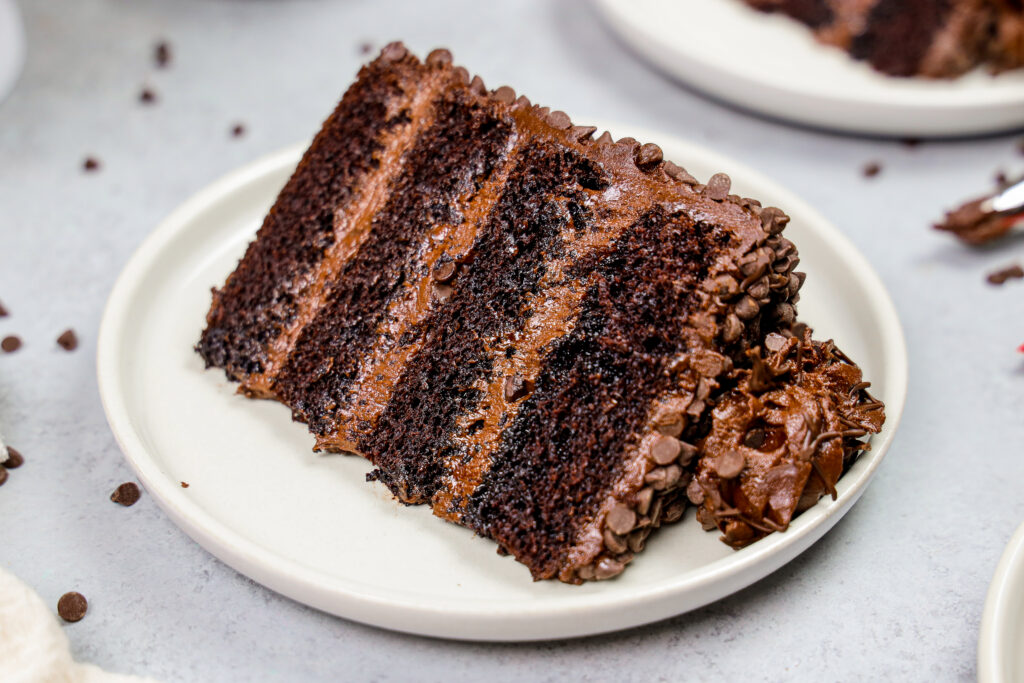
Nikki
Tuesday 13th of September 2022
I'd like to make 2, 6" 3 layer cakes with the recipe. Can you tell me what the measurements would need to be?
Chelsweets
Tuesday 20th of September 2022
Hi Nikki,
I'd recommend making 1.5 batches of batter and frosting to make 2, 6-inch cakes with 3 layers. Hope that helps, happy baking!
Elena
Wednesday 9th of March 2022
Can I double the recipe for a bigger cake? Will the sponge be able to hold 6 layers of the cake? Should I double the buttercream recipe?
Rolo Cake: Candy-Inspired Chocolate Cake with Gooey Caramel Center
Monday 14th of February 2022
[…] came the Butterfinger cake, then the gummy bear cake. Today we’re continuing our candy cake series with this Rolo […]